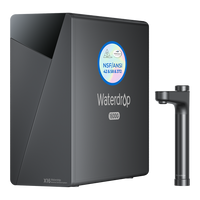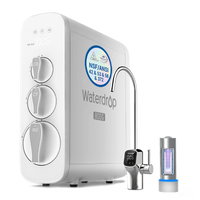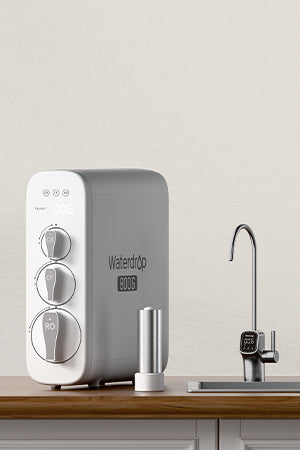We all understand the importance and the health benefits of drinking water, but which type of water should we drink? Today’s article will introduce the difference between purified water, distilled water, and tap water. You can make your water decisions based on the information we provide.
What Is Purified Water?
Purified water is water that has been treated with water treatment systems to remove the impurities from water. Both tap water and groundwater are suitable to make purified water, meaning the purified water is pretty accessible for all households.
The major contaminants that are removed from water through the water purification process include various chemical pollutants, bacteria, fungi, algae, heavy metals, and parasites. Water purification can be achieved through several methods:
- Filtration
- Sedimentation
- Coagulation
- Disinfection
These four methods vary in the ways how they purify water but could yield similar results for purified water. Only water that is lower than 10 ppm can be considered purified water, which means about 99 percent of the impurities should be removed from the water.
Health Benefits of Purified Water
As news about the water crisis keeps showing up, the benefits of drinking purified water have been noticed by more and more people. Though the tap water has been treated before supplying to your home tap, the trace chemical residue from water treatment systems and the heavy metal particles from piping systems bring potential health risks.
The chlorine residue for example. As a standard disinfect chemical, chlorine is widely used in water treatment plants around the world. However, the chlorine leftover in the tap water might lead to a series of health problems including colorectal cancer. Besides the trace chemical leftovers, purified water can protect you from water contaminants like bacteria and heavy metals, which all contribute to your overall health conditions.
The major reason why many people opt for bottled water or sugary beverages is the bad taste and odor from tap water. The purified water that is treated through activated carbon filtration systems can effectively remove the bad taste and odor in water, which allows you to enjoy safe and tasty drinking water anytime. Learn more about the
activated carbon for water filtration here.
The Waterdrop D6 reverse osmosis system is a powerful water filtration system that delivers clean, safe, and healthy drinking water to the entire household. With a filtration accuracy of 0.0001 microns, the system is able to remove viruses, bacteria, heavy metals, bad taste and odor, and any other undesirable substances in water. Because the fine RO membrane is the major filtration media, the system can also reduce the
total dissolved solids (TDS) in water, which removes the “flat” taste of water.
What Is Distilled Water?
Though often be categorized as a sole label, distilled water is also a type of purified water. The distillation process yields pure water through boiling and steam condensing. When water gets boiled through a heating source, it forms water to steam that rises up and touches the cold container surface. The water steam then condenses into pure water and leaves the solid impurities behind.
The distilled water is very ideal in terms of contaminants removal, yet, the distillation process would also get rid of the beneficial minerals. Therefore, it is not recommended to drink distilled water in the long run unless you’re advised by a doctor to do so.
What Is Tap Water?
Tap water is the municipally supplied water that you get from your water tap. The sources of tap water in the U.S. are primarily lakes, rivers, and groundwater, which depends completely on where you live in. From the source, water will go through a series of water treatment processes before pumping into your home.
Potential Contaminants in Tap Water
Though city water is regulated by authorities like the EPA, its safety is questionable. The
city water crisis cases are still being reported occasionally. The common contaminants found in the tap water include chlorine, fluoride, copper, iron, lead, arsenic, pesticides, herbicides, uranium, and more, which each one of them could cause serious health problems.
Long term exposure to high levels of copper can result in liver damage and kidney disease, and exposure to lead, on the other hand, can lead to permanent damage to the brain, kidney, and other critical body systems, especially in developing children and pregnant women.
The byproducts of the water treatment process and trace pharmaceuticals have also been found in water supplies. Though both of these impurities are trace amounts in water, the WHO has warned that these substances are not supposed to be consumed on a daily basis.
What Type of Water Should I Drink?
There is no absolute answer when choosing which type of water is the best to drink. The water choices are highly based on personal preferences. Yet, we do recommend drinking water that gets treated through a reverse osmosis system. The safe water quality for drinking is the main reason.
As we have mentioned before, the filtration accuracy of an
RO system is 0.0001 microns, meaning that almost all of the contaminants in water can be filtered out. If you are concerned about the removal of beneficial minerals in the water, you can add an additional external
remineralization filter onto your RO system to add back minerals. That also explains why we do not recommend drinking distilled water for its lack of minerals.
Tap water is not recommended to drink directly. If you would like to drink tap water, you should boil it before drinking. Boiling is one disinfect method that can help remove certain bacteria from tap water. Yet, the heavy metals and other contaminants could not be easily removed through the boiling water.
Remember to always check the local water quality to prevent contaminated water consumption. If you have health problems such as cardiovascular disease or kidney disease, you should consult with your doctors regarding which type of water is suitable to drink for you.






































































